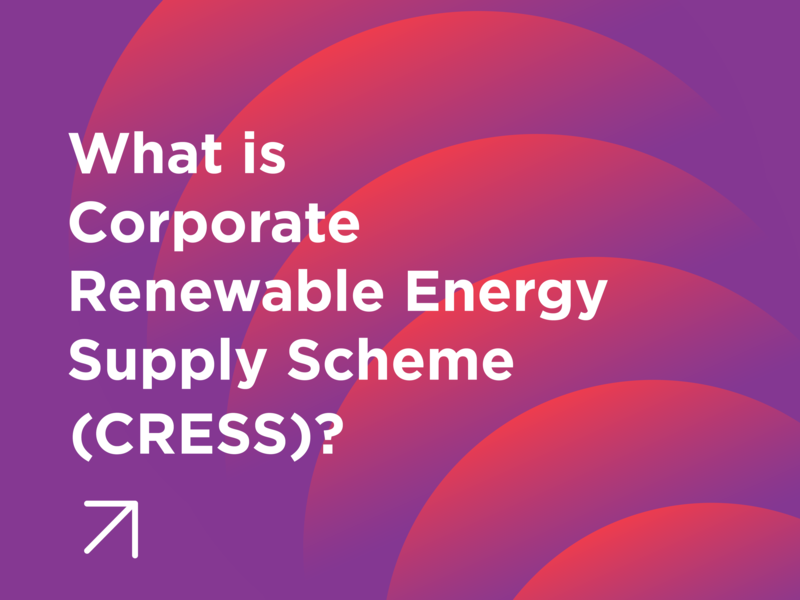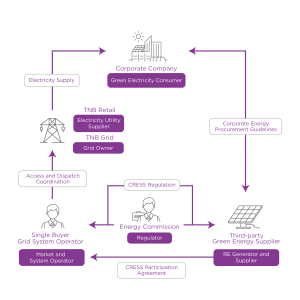

CRESS: Increase Access to Green Electricity Supply for Corporate Companies in Malaysia
The Malaysian government has announced the introduction of the Corporate Renewable Energy Supply Scheme (CRESS), a strategic initiative set to launch in September 2024, to increase corporate companies’ access to green electricity supply. Through the concept of open grid access system, third parties can supply (sell) or purchase (buy) electricity through the grid network system with a predetermined system access charge.
The introduction of the CRESS program is part of the efforts of the Ministry of Energy Transition and Water Transformation (PETRA) under the GREENS MADANI initiative, or Government Renewable Energy Enhancement for Niche Sector, which aims to support the energy transition of high-priority sectors.
Corporate companies in Malaysia have been given a few options to reduce their carbon footprint through green electricity supply. For now, companies can fulfil their green electricity commitments by installing solar photovoltaic (PV) systems through the Net Energy Metering (NEM) and Self Consumption (SelCo) Programs, purchasing Renewable Energy Certificates (RECs) through the Malaysia Green Attributes Trading System (mGATS), or subscribe to the Green Electricity Tariff (GET). On 31 August 2022, the Government also introduced the Corporate Green Power Program (CGPP) to help companies achieve their environmental, social, and governance (ESG) commitments through the virtual purchase of green electricity.
Understanding the CRESS Framework

- Under the CRESS program, eligible renewable energy generators and corporate companies can arrange green electricity supply with agreed terms through the existing supply system.
- Corporate companies can get renewable energy electricity directly from identified third-party RE generators.
- Third-party renewable energy generators can also supply renewable energy electricity to corporate consumers through the TNB grid network by participating in the NEDA market.
- Single Buyer (SB) and Grid System Operator (GSO) act as market and system operator. These two entities will coordinate “access and dispatch” in the electricity supply system based on regulatory provisions approved by the government.
- Local national utility distributor TNB will continue its role as a utility electricity supplier, ensuring a consistent supply to consumers.
- The implementation of CRESS will be regulated by the Energy Commission through the Electricity Supply Act 1990 (Act 447).
The Key Benefits of Participation in CRESS
- Reliable and consistent green electricity supply
- Flexibility to choose energy sources.
- Ability to hedge against future fluctuations in green electricity rates
- Direct pricing negotiations for green electricity
- Compliance with ESG targets for sustainability goals
This new framework opens up possibilities for more flexible and tailored energy solutions for businesses of all sizes. At Solarvest, we’re committed to helping our clients navigate these requirements and maximise the benefits of CRESS participation.
Eligibility and Participation: Is Your Business CRESS-Ready?
The Energy Commission will hold a series of briefings related to procedures and guidelines for industry players. As the launch approaches, it’s crucial for businesses to understand the eligibility criteria and prepare accordingly.
The general conditions of CRESS participation are as follows:
- Open to new RE generators for various renewable energy sources connected to the high voltage level (HV).
- Open to new users or existing users of TNB from the medium voltage (MV) and high voltage level (HV) commercial and industrial categories with additional or new electricity supply requests.
- Renewable energy generators and green consumers must connect directly through the grid network system to ensure comprehensive electricity supply planning.
- Connection limit is based on the findings of the Power System Study (PSS).
- Ability of renewable energy generators to provide firm electricity supply output for increased reliability, system stability and minimised disruption to the supply system.
- Higher access system charges will be imposed on renewable energy generators producing non-firm output.
Towards the Liberalisation of the Energy Market
The implementation of open grid access through the CRESS Program is a progressive step towards liberalising the energy market. This program is expected to reduce the risk and cost of the national electricity supply system while providing fair opportunities for developers to compete in a healthy manner. This approach will also attract more local renewable energy industry players. The focus of renewable energy development in the future will shift from the Power Purchase Agreement (PPA) model to the CRESS program.
Furthermore, implementing the CRESS Program under the GREENS MADANI Initiative is in line with the Government’s aspiration to reduce dependence on fossil fuels by increasing the capacity of renewable energy from the current 26% (10.6GW) to 40% by 2035 and 70% by 2050.
It is expected to have far-reaching economic impacts beyond the energy sector, including:
- Reduced carbon emissions by 701,000 tCO2 per year
- Direct investments exceeding RM10 billion
- Creation of nearly 14,000 new job opportunities in the sustainable energy industry
- Acceleration of industry growth and technological innovation in renewable energy
CRESS is a crucial part of Malaysia’s broader renewable energy strategy, offering businesses and corporations a unique opportunity to not only achieve sustainability goals, but also actively contribute to environmental efforts and national targets.
Now is the time to prepare your business for this transformative shift. By participating in CRESS, you can ensure your company is at the forefront of the clean energy movement, reaping both environmental and economic benefits.
Contact Solarvest today or call our hotline 1700-81-4611 to discover how we can help your business prepare for and benefit from the CRESS program.

